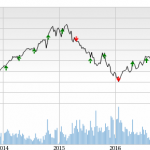Global stocks extended the longest winning streak since September, with Asia up 0.8% and Europe rising 0.7% while bonds and credit markets strengthened amid hopes that the European Central Bank will prolong quantitative easing, while optimism an Italian bailout of Monte Paschi will prevent European bank contagion, has pushed European financial stocks higher. US equity futures were little changed.
A note from Goldman’s David Kostin overnight perhaps summarized it best: “Large-cap fund managers embrace Hope over Fear.” For now hope is certainly in the driver’s seat, leading European equities higher for a third day, with the Bloomberg World Banks Index trading at the highest level in more than a year. Bonds rose across the euro area, with the yield on the benchmark German bund falling from the highest in almost three weeks, while perceived investment-grade credit risk fell for a seventh day, the longest run since May. The pound fell after an unexpected decline in manufacturing output.
The Stoxx Europe 600 Index added 0.7% as of 10:46 a.m. in London as mining companies and banks rallied. Credit Suisse AG gained 8 percent, while Banca Monte Paschi rose 7.1 percent after La Stampa reported Italy will ask for a 15 billion euro ESM loan for the lender, among other banks.

Investors’ concerns were that a defeat for Renzi in a referendum on constitutional reforms could further undermine faith in the European Union – following Britain’s decision to quit the bloc – as well as confidence in the euro currency. Market reaction to Renzi’s defeat and his resignations was relatively muted, partly as a consequence of a pledge by the ECB to buy Italian government debt if markets became unsettled. “Despite the fact that the probability of early elections has risen, the market is focusing on the banking sector and the fact the government seems to be showing more urgency in dealing with that problem,” Mizuho strategist Antoine Bouvet said.
“People had gone into the referendum with a very pessimistic view and I think the last five years have taught us that, as far as the euro is concerned, political issues often don’t have a lasting impact,” DZ Bank currency analyst Sonja Marten said.
Ahead of tomorrow’s ECB announcement (previewed here), investors are positioned for an extension of monthly asset purchases of 80 billion euros ($86 billion) past March even as uncertainty lingers that Draghi may inject an element of hawkishness and hint at tapering or even ending QE at some point in the future. With overnight volatility on the euro at the highest since the U.K.’s vote to leave the European Union in June, traders are hedging bets that ECB President Mario Draghi will carry on with accommodative policies. Last year he defied weeks of anticipation for more support with underwhelming stimulus that sent bond yields and the euro surging.
“The base expectation is that we are going to get an extension of the stimulus program by another six to nine months,” said Michael Hewson, a market analyst at CMC Markets in London. “Broad sentiment is starting to turn around — we are getting some repositioning for a better 2017 in terms of growth.”
Japan’s Topix index gained 0.9% in Tokyo as the MSCI Asia Pacific Index added 0.4%. Futures on the S&P 500 Index were little changed after the measure posted a 0.3% advance on Tuesday. The Dow Jones Industrial Average rose 0.2 percent to close at another record.
Brent and WTI rose after the Kremlin said Russian President Vladimir Putin personally agreed to output cuts with the nation’s oil companies. Brent above $54/bbl, WTI above $51/bbl. “The headlines that Putin personally agreed to the oil output cut sent prices higher,” says Ole Hansen, head of commodity strategy at Saxo Bank. “This adds to the pressure on OPEC to deliver their own cuts.” “The market is taking that at face value and looking for at least half of the 600k b/d non-OPEC cut to be assured.” The one-minute trading volume in WTI hit day-high >1,900 lots at 9:17am London time, shortly after Russia headlines.
One of the biggest movers in the currency markets was the Australian dollar, down 0.4 percent after data showed the Australian economy shrank by 0.5 percent, its biggest contraction since 2008, in the third quarter. Australian stocks, however, closed 0.9 percent higher in anticipation of more fiscal and monetary stimulus. While rate futures imply scant chance of a Reserve Bank interest rate cut in the coming months, prospects of a hike vanished.
China’s foreign exchange reserves fell by more than expected last month to $3.05 trillion, their lowest since 2011, the central bank said. The yuan currency last stood at 6.8850 to the dollar compared to a mid-point of 6.8808 set by the central bank. The currency is down 5 percent so far this year.
In rates, Germany’s 10-year bond yield fell two basis points to 0.34 percent, after climbing to 0.38 percent, the highest since Nov. 14. The government plans to sell 3 billion euros of 2018 securities. Italian sovereign debt securities due in a decade advanced for a second day, almost erasing losses suffered in the aftermath of Sunday’s referendum. The nation’s 10-year bond yield fell four basis points to 1.91 percent, adding to a four-basis point drop from Tuesday. Portugal’s 10-year bond yield reached the lowest level since Nov. 15. Treasury 10-year note yields were little changed at 2.37 percent. The Markit iTraxx Europe Index of credit-default swaps on investment-grade companies dropped one basis point to 74 basis points, the lowest since Nov. 9. A gauge of swaps on junk-rated companies fell to a three-month low.












Leave A Comment